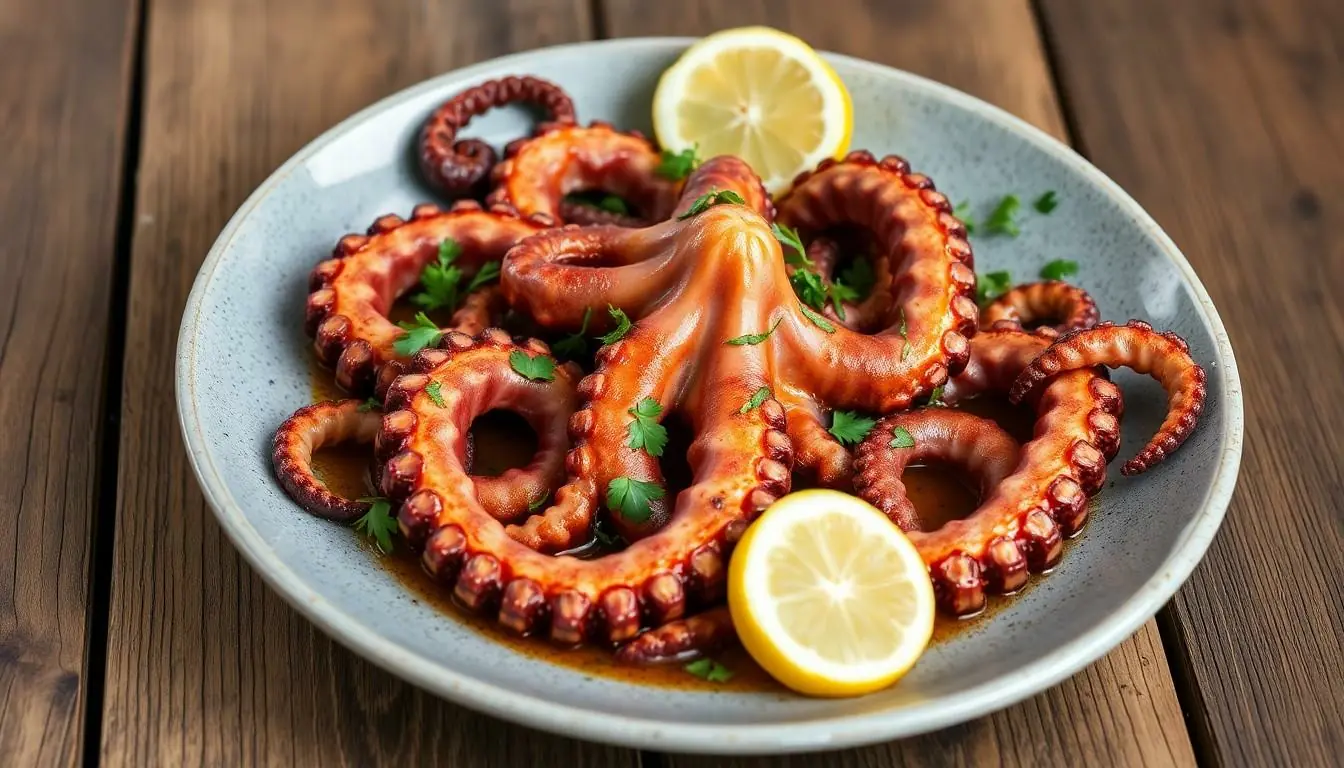Octopus might not be the first thing that pops into mind when thinking about healthy eating, but it’s time to give this eight-legged marvel a chance. Imagine sinking your teeth into a tender, grilled octopus dish while knowing it’s packed with nutrients. Who knew that a creature often found in the depths of the ocean could be a nutritional powerhouse?
Rich in protein and low in calories, octopus offers a delicious way to elevate any meal. Plus, it’s a great source of omega-3 fatty acids, which are known for their heart-healthy benefits. So, whether you’re a seafood aficionado or just curious about trying something new, diving into the world of octopus could be a tasty and healthy adventure. Let’s explore whether this intriguing delicacy deserves a spot on your plate.
Table of Contents
ToggleOverview Of Octopus Nutrition
Octopus offers significant nutritional benefits, making it a healthy food choice. Its composition includes essential macronutrients and micronutrients that contribute to overall well-being.
Macronutrients In Octopus
Octopus contains a high protein content, providing about 30 grams per 100 grams serving. This lean protein supports muscle growth and repair. Low in calories, a 100-gram serving typically contains around 164 calories, making it suitable for weight management. Additionally, octopus features minimal fat, roughly 1.7 grams per serving, with beneficial omega-3 fatty acids that promote heart health.
Micronutrients In Octopus
A variety of vitamins and minerals exist in octopus. Vitamin B12 takes precedence, offering approximately 20 micrograms per serving, vital for nerve function and red blood cell formation. Iron is also notable, with about 7.5 milligrams per serving, essential for transporting oxygen in the blood. Selenium, another mineral present, provides antioxidant properties, supporting immunity and thyroid function. These micronutrients combine to enhance overall health, making octopus a nutritious option.
Health Benefits Of Eating Octopus

Eating octopus offers various health advantages. Notably, it provides essential nutrients that can support overall well-being.
Rich Source Of Omega-3 Fatty Acids
Omega-3 fatty acids play a crucial role in heart health. Octopus contains significant levels of these beneficial fats. One serving can supply approximately 1,000 milligrams of omega-3s, promoting better cardiovascular function. Research shows omega-3s can reduce inflammation and lower the risk of heart disease. Including octopus in the diet helps maintain healthy cholesterol levels, contributing to improved heart health.
High-Quality Protein Content
Octopus serves as a high-quality protein source. A 100-gram serving delivers about 30 grams of protein, which supports muscle growth and repair. With low calories and minimal fat, it aids in weight management as well. This lean protein option is especially beneficial for those following a low-fat diet. Including octopus helps meet daily protein requirements without excessive calorie intake, making it a smart choice for health-conscious individuals.
Potential Antioxidant Properties
Antioxidants are essential for combating oxidative stress. Octopus contains a variety of antioxidants that support cellular health. These compounds can help protect the body from free radicals. Regular consumption may contribute to reduced risk of chronic diseases. Incorporating octopus into meals adds these protective elements, enhancing overall health. Several studies indicate that seafood rich in antioxidants, like octopus, can boost the immune system, further highlighting its health benefits.
Potential Risks Of Consuming Octopus
Consuming octopus carries certain risks that should be considered. Understanding these risks aids in making informed dietary choices.
Allergic Reactions
Allergic reactions to octopus can occur, especially in individuals allergic to shellfish. Symptoms may include hives, swelling, or difficulty breathing. It’s crucial for those with known allergies to seek medical advice before consuming octopus. In some cases, anaphylaxis may result, necessitating immediate medical attention. For potential allergy sufferers, caution and awareness play significant roles in safe consumption.
Contaminants And Environmental Concerns
Contaminants found in octopus may pose health risks. Heavy metals, like mercury and lead, often accumulate in marine organisms due to water pollution. Regular consumption of contaminated seafood can lead to serious health issues over time. Ensuring the octopus is sourced from clean, sustainable waters mitigates some risks. It’s advisable to choose reputable suppliers who prioritize environmental safety to minimize exposure to harmful substances. Furthermore, governmental guidelines often suggest limiting intake of seafood known to have higher contaminant levels.
Dietary Considerations
Octopus is versatile and offers numerous culinary options. Preparing octopus can take various forms, including grilling, boiling, or sautéing. Common dishes featuring octopus include Mediterranean salads, sushi, and seafood stews. Each preparation method enhances its tender texture and unique flavor.
Culinary Uses Of Octopus
Chefs often use octopus in a variety of dishes. Grilled octopus offers a smoky taste, while marinated versions highlight flavor profiles tied to spices and herbs. In Mediterranean cuisine, octopus salads pair with fresh vegetables and drizzle olive oil for an added richness. Additionally, sushi enthusiasts enjoy octopus in nigiri or as a sashimi option. Its adaptability makes it a favored ingredient across different culinary traditions.
Recommended Serving Sizes
Portion sizes for octopus typically vary based on dietary needs. A standard serving is around 85 to 113 grams, providing about 25 to 30 grams of protein. This amount suits most dietary guidelines, offering optimal health benefits without excess calories. Individuals can enjoy octopus several times a week, balancing it with other seafood options. Maintaining this variety supports a well-rounded diet.
Eating octopus can be a nutritious choice that adds variety to a balanced diet. With its high protein content and beneficial omega-3 fatty acids, it supports heart health and muscle maintenance. While there are some risks to consider, such as allergies and potential contaminants, sourcing octopus responsibly can mitigate these concerns.
Incorporating octopus into meals offers a delicious way to enjoy its unique flavor and texture. Whether grilled, boiled, or sautéed, it’s a versatile ingredient that can enhance various dishes. By enjoying octopus in moderation and alongside other seafood, individuals can reap its health benefits while savoring a culinary delight.




